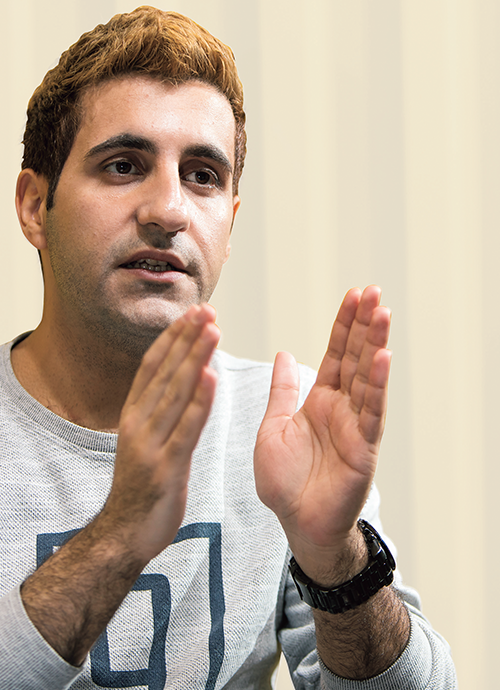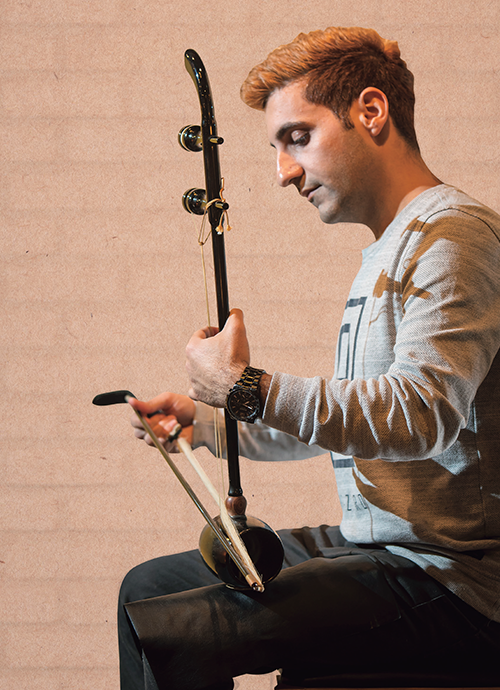Radical changes are never easy, but Cevzet Tam made two within a short time. First he left Turkey to study computer science and IT in faraway Korea, then switched his major to traditional Korean music. These changes would not have been possible without his perseverance and love for his host country.
For some people, a transformative moment in life occurs through sheer coincidence - a beckoning from Dame Fortune.
For Cevzet Tam, it happened one day during a walk in Seoul. Feeling forlorn, he heard the melancholy sound of a haegeum being played by a busker. “I was only 19 then, feeling sad and lonely and missing my family in Turkey,” Cevzet said. “It was as if the traditional Korean fiddle was weeping for me.”
The chance encounter with a foreign musical instrument reset his direction in life.
From Math to Music

Noting that Koreans reveal little cultural identity in their popular music, Cevzet Tam wishes K-pop composers would inject more elements of traditional Korean music just as Turkish musicians use their native instruments to play modern music.
Back home in Turkey, Cevzet attended a class for gifted math students. Fittingly, he set out to be an engineer and decided to study computer science and information technology in Korea. But after arriving in 2012 and completing a one-year Korean language course, Cevzet was nowhere near IT. Instead, he entered Seoul National University’s Department of Traditional Korean Music and majored in the haegeum.
Exactly what was so mesmerizing about the ancient foreign musical instrument? How did a 19-year-old who couldn’t even read music become so captivated by it?
“I myself don’t know exactly why,” Cevzet admitted. “Maybe I had some liking for music in me without realizing it. When I saw the haegeum for the first time, it reminded me of a similar Turkishinstrument, called saz. Anyway, the more I listened to its sound, the more I came to like it. It produces sounds that words cannot describe - sad and sorrowful but sometimes humorous.”
The haegeum is a simple instrument; it has two silk s, a wooden sound box and a rod-like neck. Placed upright on the p’s knee, it has been a timeless fixture of Korean traditional music, played in royal palaces as well as rural backyards. Eight materials are used to build this instrument: wood, metal, silk, stone, bamboo, gourd, clay and hide. Thus, the instrument is also called pareum, meaning “eight sounds.” Another name is kkaengkkaeng-i, an onomatopoeia of its high-pitched sound.
Nobody was more surprised by Cevzet’s abrupt switch than his family. Everyone had expected Cevzet, the youngest of six siblings, to become a handsomely paid engineer after studying in Korea. His sudden announcement that he would study music and take up an unfamiliar musical instrument especially upset his father.
“At first, my father refused to talk with me for over a month. It took me nearly three years to persuade him to fully accept my decision,” Cevzet said. “My father slowly began to change his mind as he saw me studying hard and receiving a scholarship from the school.”
After Cevzet appeared on Korean TV, the misgivings melted. “My father said he was proud of me for introducing our country Turkey to Koreans,” Cevzet said. Not only his father but other family members now also warmly support him. However, Cevzet said, Turkey is too far away from Korea for him to get more than moral support from his family. Filling the void are Korean acquaintances. Some are like surrogate parents to him.
Korean Patrons
One of them is Professor Yang Young-sook at Seoul National University, who is also Cevzet’s academic adviser. “Professor Yang helped me endure my undergraduate years, taking care of me in many ways, even feeding me,” Cevzet said. “Three students were majoring in the haegeum each year in my department. Although I lagged behind the other students, both of them Korean, professors gave me a handicap. That’s how I could get 3.2 out of 4 points. Professor Yang was like my mother, without whom I could hardly have finished my studies.”
Cevzet also has a “Korean father,” an executive at a night club where he used to work as a part-time DJ. When Cevzet is sick, he visits his home, bringing with him grain porridge and fruit. He also calls occasionally to make sure that Cevzet has paid his rent and check whether he needs any financial help.
What makes these Koreans want to assist this young man from a faraway country? Yes, Cevzet is a likable guy with a pleasant smile. But above all, perhaps they are moved by his positive and enthusiastic attitude toward learning and working, always doing everything that he can to reach his goals. No time is wasted. During the daytime, Cevzet practices the haegeum and studies composition, and at night, he works part-time at clubs, either as a DJ or a server.
On how he would advise young people aspiring to study traditional music of other countries - for example, a young Korean who wants to learn a traditional Turkish instrument - he said the first and foremost thing to do was to study, and preferably love, the country’s culture. “You should first understand people’s way of thinking, their minds and thoughts,” he said.
That explains why Cevzet joined a band called “Hangeul,” a polyglot of 11 foreigners working in Korea. The band, whose members include musicians hailing from Britain, Spain, Turkey and Japan, performs at various events, first in their native tongues and then in Korean. While Hangeul is the name of the Korean alphabet, Cevzet explained that the band’s name is a composite of “Han” (from “Hanguk” meaning Korea) and “geul” (the Korean pronunciation of the first syllable of “global”), hence standing for “global artists introducing Korea to the world.”
Cevzet currently belongs to FMG (Foreign Manpower Group), an entertainment agency that manages about 50 foreigners in Korea. He occasionally appears on Korean TV and radio programs, but not as a regular cast member. He hopes to appear on “Welcome, First Time in Korea?” The popular TV show has expatriates in Korea invite friends from their home countries, allowing audiences to rediscover Korea through tourists’ eyes.
“I have to study by day and work by night. There are many obstacles I have to surmount.
However, I have never once regretted my decision.”
Brother Countries
Despite their geographic distance and cultural differences, Korea and Turkey have long regarded each other as “brother countries,” largely due to Turkish troops who came to fight under the United Nations flag in the Korean War (1950-1953).
Cevzet believes the two countries have several things in common. He said: “For example, our languages have the same word order, which may mean that Koreans and Turks have a similar way of logical reasoning. Moreover, unlike Westerners, both Koreans and Turks take off their shoes when entering into homes. Also, Turkish people, particularly men, easily lose their temper, like Korean men, but let off steam in less than 10 minutes, again like Koreans.”
“More than anything else, the traditional music of the two countries has a similar atmosphere,” Cevzet said. “Just like Korean songs, many Turkish songs are sad and mournful, lamenting unrealized love, such as those sung by wives missing their men who are away at war. Of course, Turkey has less frequently been occupied by foreigners than Korea, but there have been many wars in our history, too.”
The musical scales and notes are different. Nevertheless, Cevzet said his ultimate goal is tocompositions that combine Korean and Turkish music.
When asked whether he was in love with Korea and, if so, why, Cevzet seemed a little embarrassed. Then he gave a rather curt reply: “If I didn’t love Korea, why would I try so hard to make Korea and its culture better understood by other foreigners?”
Cevzet said he had not experienced many difficulties while living in Korea because most Koreans he has met were kind to him. The glaring exception was a club owner who refused to pay him about one million won (approximately US$8,900) in back salary. “Most Koreans are kind to expats, but I think they tend to be somewhat afraid, or wary, of foreigners, especially in the early stage of getting acquainted,” he said, pointing to the lingering xenophobia.
Cevzet admitted he was getting along well with his Korean friends and colleagues, but some newly arrived foreigners seem to have considerable difficulties, particularly before they get used to the Korean way of living. “I advise foreigners wanting to study or work in Korea to learn the language first,” he said. “Like in most other countries, there is a big difference in landing jobs here between people who know some Korean and those who do not.”
In this regard, Cevzet suggested the Korean government provide Korean language lessons for free or at a discount. He lauded the Korean government’s multicultural policies, but hoped its programs would be more practical to help newcomers adjust to Korean culture and lifestyle more easily and quickly. “As always,” he said, “the biggest problem is the economic problem - getting a job and extending one’s visa period.”
“It’s not easy to live as a musician in Korea. Most students majoring in music here appear to have wealthy parents,” he said. “I have to study by day and work by night. There are many obstacles I have to surmount. However, I have never once regretted my decision.”

Cevzet Tam believes the haegeum unlocked his passion for music and his potential as a musician.
Living as a Musician in Korea
Cevzet likes Korean pop music but says he sometimes cannot help but think Koreans tend to lack identity in their cultural activities. He quoted Turkey’s founding father, Mustafa Kemal Atatürk, who said that if people do not know their history and culture, their future is dark. Cevzet also cited the example of Turkish musicians using the sound of their traditional instrument, saz, in modern music. “Likewise,” he said, “I would like to see K-pop composers use more elements of traditional Korean music in their works through the fusion of old and new.”
Despite working part-time at a club, Cevzet does not like liquor much. “Turkey is an Islamic country, you know, so we don’t drink much and are quite careful in choosing food, and eating pork is a taboo,” he said. “Except for that, I have few problems with Korean food.”
Asked where he sees himself in five years, Cevzet said it would be nice if he was a better musician by then. If he stays on course, by around 2025, Koreans will likely be listening to the first haegeum sonata composed by a foreigner.
Choi Sung-jinExecutive Editor, Korea Biomedical Review
Ha Ji-kwonPhotographer